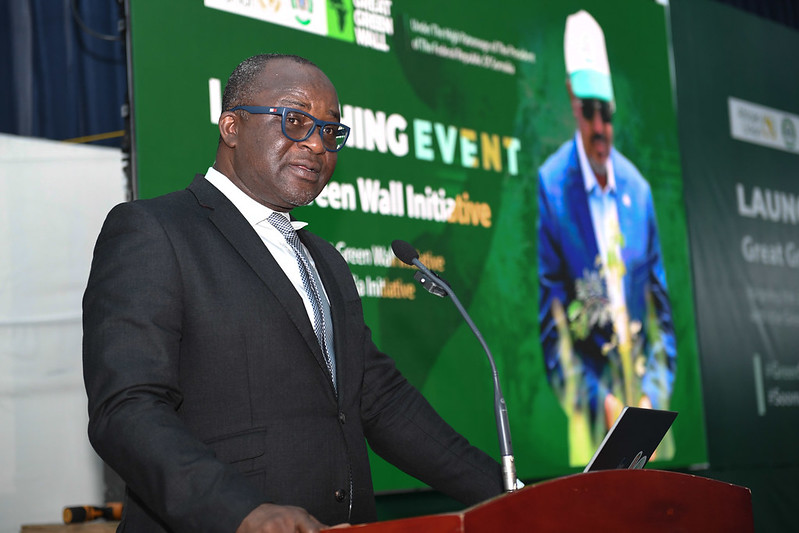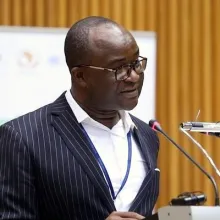See the Full interview here.
In the heart of Africa’s narrative lies a paradox: while many perceive the continent’s dry lands as impoverished, they are, in fact, reservoirs of unparalleled richness and potential. Elvis Paul Tangem, Head of the Unit for Land Management at the African Union Commission’s Directorate of Sustainable Environment and Blue Economy, challenges this prevailing misconception. “These are not poor areas,” Tangem asserts. “They are areas with immense potential.”
Indeed, these dry lands, constituting 60 to 70 percent of the continent’s landmass, are pivotal to Africa’s socio-economic fabric. Yet, they face daunting challenges exacerbated by climate change and historical neglect. The Great Green Wall initiative emerges as a beacon of hope, harnessing the natural wealth of these regions to foster sustainable development and climate resilience. Since its inception in 2005, with formal recognition as a flagship program in 2007, the Great Green Wall has evolved from a focus on the Sahara to encompass the broader Sahel region and, more recently, Southern Africa. Tangem emphasizes the initiative’s inclusive approach, engaging diverse stakeholders including member states, regional bodies like the Southern Africa Development Community (SADC), and international partners such as the United Nations and civil society organizations.

“Expansion is essential,” Tangem affirms, noting recent efforts to integrate countries like Somalia and Kenya into the initiative. This pan-African strategy aims to address the escalating challenges posed by desertification and drought across the continent. Tangem highlights the initiative’s wide-reaching impact, spanning from the Sahel’s 11 nations to Southern Africa’s 16 SADC member states, and extending to coastal and island nations like Côte d’Ivoire, Seychelles, and Mauritius. Partnerships play a pivotal role in the Great Green Wall’s success story. Tangem underscores the collaboration with organizations like the Catholic Relief Services (CRS), renowned for their expertise in sustainable land and soil management. This partnership exemplifies the initiative’s holistic approach, integrating technical expertise and financial support to drive strategy development and implementation.
The launch of the new Great Green Wall strategy at the Africa Fertilizer and Soil Health Summit underscores the initiative’s momentum. Tangem highlights ongoing discussions and strategic planning sessions, affirming the commitment to enhancing member states’ capacity in sustainable land management and restoration efforts.
As Tangem concludes, the Great Green Wall initiative stands not just as a testament to Africa’s resilience but also as a unified effort towards securing a sustainable future for generations to come. With each new partnership forged and each acre restored, the vision of a greener, more prosperous Africa becomes increasingly within reach.
See the Full interview here.
UNCCD COP 16 and Recommendations by CSOs and Governments
The 16th Conference of the Parties (COP 16) to the UNCCD is a crucial event where stakeholders from across the globe come together to discuss and formulate strategies to combat desertification. Civil society organizations (CSOs) and governments play a significant role in these discussions, often bringing diverse perspectives and solutions to the table. Key recommendations from CSOs and governments at COP 16 include:
- Strengthening Local and Indigenous Practices: Emphasizing the importance of traditional knowledge and practices in combating desertification, and integrating these with modern scientific approaches.
- Enhancing Funding Mechanisms: Increasing financial support for projects aimed at land restoration, sustainable land management, and capacity-building at local levels.
- Promoting Community-Led Initiatives: Encouraging grassroots movements and local community involvement in planning and implementing restoration projects to ensure sustainability and inclusiveness.
- Boosting Collaboration and Partnerships: Fostering partnerships between governments, the private sector, CSOs, and international organizations to leverage resources and expertise.
- Innovative Technology and Data Utilization: Utilizing advanced technologies and data analytics to monitor, assess, and manage land degradation effectively.







Leave a Reply